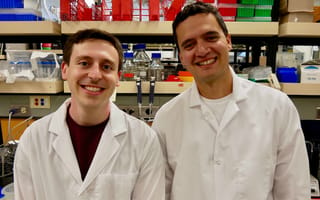
In recent years, powerful tools have emerged that allow any biotechnology researcher or student with the proper knowledge of biochemistry to build their own synthetic proteins. Certain platforms — like the one built by Seattle’s Cyrus Biotechnology — can create thousands or even millions of new types of proteins, which pharmaceutical companies can use to create new drugs.
But the process of testing whether those proteins will actually create the desired effects remains a costly, arduous process, creating a bottleneck in the workflow.
University of Washington Ph.D. graduate David Younger has banded together with a group of fellow high-tech Huskies to form A-Alpha Bio, an early-stage startup that may have created a solution to streamline protein testing. The young company just received a $225,000 Small Business Innovation Research grant from the National Science Foundation to expand the capabilities of its solution, called AlphaSeq.
Once completed, the company may be eligible for up to $750,000 in further funding to scale up.
“Proteins are the workhorses of biology,” Younger explained. “They catalyze reactions, they bind to things, they form structural elements in cells, they hold cells together, they govern immune responses — they’re a ubiquitous part of the biological process.”
To test whether a synthetic protein will act in the way researchers hope it might, A-Alpha Bio uses genetically engineered yeast cells, essentially coating individual cells with multiple copies of the same protein. By putting masses of cells coated in different proteins together and watching the reactions — mainly to see which of them stick to one another — Younger and his team can determine whether a protein will perform as hoped.
Or, at least, whether it’s worth investing the time and resources involved with testing the protein more thoroughly.
Pharmaceutical companies are working on drugs to block interactions between proteins that cause uncontrolled cell growth — otherwise known as cancer. However, there are millions of healthy interactions that also occur between cells, and blocking them could cause major side effects. A-Alpha Bio’s team believes their technology may be able to prevent major side effects by eliminating the proteins that cause them before the testing stage.
The company uses next-generation sequencing software to turn their lab results into actionable intelligence on which proteins interact with one another, and the strength of each interaction.
“A big part of the technology is the processing and algorithms we have to apply to turn that wet lab asset into a functional readout that pharmaceuticals can use,” Younger said.

A-Alpha Bio currently consists of Younger and his co-founding CTO, Randolph Lopez, with a third founder, Bob Lamm, expected to come on full time once he finishes his studies. But although A-Alpha Bio will soon have three bioengineering Ph.Ds., none of the three had any prior business experience before setting out on their startup journey.
“This is all our first time in the business world, which has been daunting,” Younger said. “But we’ve been enabled by all the support we’ve received.”
Younger said A-Alpha Bio owes much of its success so far to science trade association Life Science Washington, the National Science Foundation and numerous departments within the University of Washington, especially CoMotion Labs and the Arthur W. Buerk Center for Entrepreneurship.
“The best advice I received — and we’ve taken pretty good advantage of it — is to utilize the resources around us,” Younger said. “One thing that has blown me away in the entrepreneurial community is how generous people are with their time. It’s very much a culture of giving back. Hopefully we get to the stage where we can do some of that ourselves.”






